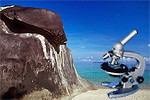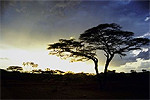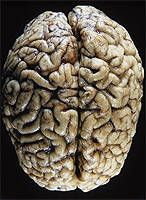Neuroscience For Kids
A Career in Neuroscience: A Game of "Survivor?"
 I admit it. I watch "Survivor," the TV game show that strands
16 people in the middle of nowhere. These contestants must work together
to find food, build shelters and compete for rewards. Every three days,
"members of the tribe" vote one person out. The last person remaining
wins one million dollars. Many aspects of Survivor remind me of
life as a research neuroscientist.
I admit it. I watch "Survivor," the TV game show that strands
16 people in the middle of nowhere. These contestants must work together
to find food, build shelters and compete for rewards. Every three days,
"members of the tribe" vote one person out. The last person remaining
wins one million dollars. Many aspects of Survivor remind me of
life as a research neuroscientist.
Abandoned in the Wilderness
 Although neuroscientists are not abandoned on a deserted
island, banished to the Amazon jungle or stranded in the Australian
outback, they are placed in laboratories where they are expected not only
to survive, but also to thrive. If they are lucky, neuroscientists arrive
in their labs with more than the one luxury item that TV's survivors can
take to their new homes. Sometimes neuroscientists inherit lab space and
equipment from scientists who have retired or moved to different jobs.
Many are provided with start-up money to stock their labs with equipment
and supplies. To thrive, scientists must become leaders and attract
graduate students and post-doctoral fellows to come to their lab to join
in the experiments and activities. As in Survivor, different
people have different skills, and the scientist's job is to match projects
with people who 1) have an interest in the subject matter and 2) have the
skills and attitude to work on certain projects.
Although neuroscientists are not abandoned on a deserted
island, banished to the Amazon jungle or stranded in the Australian
outback, they are placed in laboratories where they are expected not only
to survive, but also to thrive. If they are lucky, neuroscientists arrive
in their labs with more than the one luxury item that TV's survivors can
take to their new homes. Sometimes neuroscientists inherit lab space and
equipment from scientists who have retired or moved to different jobs.
Many are provided with start-up money to stock their labs with equipment
and supplies. To thrive, scientists must become leaders and attract
graduate students and post-doctoral fellows to come to their lab to join
in the experiments and activities. As in Survivor, different
people have different skills, and the scientist's job is to match projects
with people who 1) have an interest in the subject matter and 2) have the
skills and attitude to work on certain projects.
Scientists must also know how to motivate people. The scientist's success and reputation are based on the work of the lab, so the scientist must know how to get people to work more efficiently: when to push people or when to encourage and praise.
Teamwork
 When the TV survivors arrive at their new locations, they must
build shelters to protect themselves from the weather and find food to
nourish themselves. Scientists often find themselves in a similar
situation. They may not have to search further than a cafeteria for food,
but their laboratory may not have the necessary equipment, chemicals,
computers, and other supplies for conducting experiments. In addition to
attracting graduate students and post-doctoral fellows, neuroscientists
usually recruit additional personnel such as technicians to help with lab
work. Both survivors and neuroscientists depend on others and it is
important that everyone get along so they can get their work done.
When the TV survivors arrive at their new locations, they must
build shelters to protect themselves from the weather and find food to
nourish themselves. Scientists often find themselves in a similar
situation. They may not have to search further than a cafeteria for food,
but their laboratory may not have the necessary equipment, chemicals,
computers, and other supplies for conducting experiments. In addition to
attracting graduate students and post-doctoral fellows, neuroscientists
usually recruit additional personnel such as technicians to help with lab
work. Both survivors and neuroscientists depend on others and it is
important that everyone get along so they can get their work done.
 Teamwork is important for people on deserted islands and for people in
laboratories. Survivor team members must use teamwork to compete in
games that involve hunting for clues and answers or navigating obstacle
courses while tied together. These competitions require that everyone on
the team cooperate. Cooperation is essential in the lab too. Different
members of the lab team may have different responsibilities. For example,
the technician may prepare the set-up for an experiment and assist
graduate students. After the initial preparation is completed, other
neuroscientists may collect data. After people obtain their results,
everyone discusses the findings, brainstorming to figure out what they
mean and what to do next. Different tasks are assigned to different
people so that the experiments will be successful.
Teamwork is important for people on deserted islands and for people in
laboratories. Survivor team members must use teamwork to compete in
games that involve hunting for clues and answers or navigating obstacle
courses while tied together. These competitions require that everyone on
the team cooperate. Cooperation is essential in the lab too. Different
members of the lab team may have different responsibilities. For example,
the technician may prepare the set-up for an experiment and assist
graduate students. After the initial preparation is completed, other
neuroscientists may collect data. After people obtain their results,
everyone discusses the findings, brainstorming to figure out what they
mean and what to do next. Different tasks are assigned to different
people so that the experiments will be successful.
Challenges
 Island and outback survivors compete for rewards such as blankets, tools
and food. They may have to outlast other competitors by standing on poles
or by eating a mangrove worm. Neuroscientists compete with each other for
rewards too (but they don't have to eat any worms). One of the biggest
rewards for a neuroscientist is a research grant: this is money to buy
equipment and supplies and to hire people to work. To get such a grant, a
neuroscientist must write a successful application and compete with other
neuroscientists who are also trying to get research funding. The largest
funding agency for scientists in the United States is the National Institutes of Health (NIH). The
NIH has a total budget
of approximately $29 billion and a portion of this is set aside for
neuroscience research. Although the NIH budget may appear large, not all
projects that people propose are funded. Scientists compete with one
another for the same research dollars and many projects are never
funded.
Island and outback survivors compete for rewards such as blankets, tools
and food. They may have to outlast other competitors by standing on poles
or by eating a mangrove worm. Neuroscientists compete with each other for
rewards too (but they don't have to eat any worms). One of the biggest
rewards for a neuroscientist is a research grant: this is money to buy
equipment and supplies and to hire people to work. To get such a grant, a
neuroscientist must write a successful application and compete with other
neuroscientists who are also trying to get research funding. The largest
funding agency for scientists in the United States is the National Institutes of Health (NIH). The
NIH has a total budget
of approximately $29 billion and a portion of this is set aside for
neuroscience research. Although the NIH budget may appear large, not all
projects that people propose are funded. Scientists compete with one
another for the same research dollars and many projects are never
funded.
 Scientists working in universities are in sink-or-swim-situations. They
are given a lot of freedom (there is no time clock to punch in and out),
but they are judged by their results. This includes the number and
quality of papers they publish and research grants they obtain. If they
don't have any publications, they most likely will not get grant money --
this is like being voted off the island.
Scientists working in universities are in sink-or-swim-situations. They
are given a lot of freedom (there is no time clock to punch in and out),
but they are judged by their results. This includes the number and
quality of papers they publish and research grants they obtain. If they
don't have any publications, they most likely will not get grant money --
this is like being voted off the island.
Writing a successful grant application is perhaps the biggest challenge for neuroscientists. It also comes with the biggest reward. A successful application requires meticulous planning, careful background research, and clear writing. Grant reviewers read and rate grant applications asking questions such as:
- Does the study address an important problem?
- Are the methods to be used appropriate?
- Is the study novel -- that is, does it break new ground?
- Are the personnel trained properly to do the experiments?
- Does the scientist have adequate resources to do the experiments?
 Unlike island/outback survivors, neuroscientists do not win blankets,
matches or food for winning a challenge. Rather neuroscientists win a
grant that allows them to get the resources to continue their
research.
Unlike island/outback survivors, neuroscientists do not win blankets,
matches or food for winning a challenge. Rather neuroscientists win a
grant that allows them to get the resources to continue their
research.
Neuroscientists compete against each other in other ways. Sometimes different laboratories race against one another to report a new discovery. The first lab to report the discovery gets the credit. Just like island and outback survivors, neuroscientists find little reward in second place finishes. Labs may also compete over personnel. Promising graduate students or post-doctoral fellows with special skills may be recruited by lab directors who "steal" these people from other universities by offering more money or other benefits. Even within a university or a department, scientists may compete for personnel or laboratory and office space.
Immunity
 To stay in the television game, survivors must avoid being voted out.
One way to avoid banishment is to gain "immunity" by winning an immunity
challenge. Gaining immunity means that survivors cannot be voted out of
the game at the next voting session. For scientists, immunity is
tenure. A scientist who gets tenure has a job for life and cannot
be fired without an exceptional reason (e.g., criminal activity or
incompetence). The criteria to determine who gets tenure vary among
universities, but usually include the number and quality of publications,
the success of grant applications, teaching evaluations, public service
and letters of recommendation. Without tenure, scientists are vulnerable
to losing their jobs. Some scientists cannot even compete for tenure
because they are in "non-tenure track" positions -- jobs where tenure is
not an option. These scientists pay their own salaries and support their
laboratories with grants. Without a grant, these researchers lose their
jobs. In other words, without a grant, these researchers can be voted
off!
To stay in the television game, survivors must avoid being voted out.
One way to avoid banishment is to gain "immunity" by winning an immunity
challenge. Gaining immunity means that survivors cannot be voted out of
the game at the next voting session. For scientists, immunity is
tenure. A scientist who gets tenure has a job for life and cannot
be fired without an exceptional reason (e.g., criminal activity or
incompetence). The criteria to determine who gets tenure vary among
universities, but usually include the number and quality of publications,
the success of grant applications, teaching evaluations, public service
and letters of recommendation. Without tenure, scientists are vulnerable
to losing their jobs. Some scientists cannot even compete for tenure
because they are in "non-tenure track" positions -- jobs where tenure is
not an option. These scientists pay their own salaries and support their
laboratories with grants. Without a grant, these researchers lose their
jobs. In other words, without a grant, these researchers can be voted
off!
The Prize
Neuroscientists are not competing for a million dollars. Most have selected their careers because they enjoy their work and take pride in contributing to our knowledge about the nervous system. This cannot be measured in dollars and cents. Every experiment reveals something new, something to wonder about and to investigate further. It's the thrill of revealing something no one has seen before that drives many scientists...perhaps something that holds the promise of helping someone stricken by a neurological disease or that explains how the brain works. That's the prize. For those who have chosen to play the research neuroscientist "game," the rewards are worth the challenges.
![]() Printable version of this page.
Printable version of this page.
"A Few Minutes With..." -- Dr. Eric Chudler interviews neuroscientists
Copyright © 1996-2021, Eric H. Chudler All Rights Reserved.
